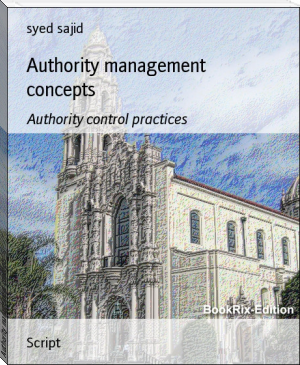Freedom Incorporated - Peter Tylee (best biographies to read TXT) 📗

- Author: Peter Tylee
- Performer: -
Book online «Freedom Incorporated - Peter Tylee (best biographies to read TXT) 📗». Author Peter Tylee
“And PortaNet found out that he knew?” Dan asked with rising nausea.
“Of course, he told them. He wanted to make sure they understood how serious the matter was. We could not believe people deliberately risk black holes for money. We thought they did not know. Lars had physicist contacts inside the company, which is how he got the sample of SuperFlex. But when he told them of his discovery, others were listening.”
“Echelon?”
“No, the security team of PortaNet. Lars was in Sydney to deliver his findings at an international subatomic-physics convention when the cleaning crew of PortaNet killed him.” He looked at Dan. “Which is where you came in.”
Dan nodded, mute.
Simon didn’t know what to say either.
But Hans didn’t have that problem. He finally had someone to talk to, and an even bigger blessing - they were willing to listen. “I do not believe everyone who works for PortaNet knows what happens. Those that do know keep it very quiet. I know they have commissioned a department to take care of the waste, called the Generation Planners.” He smiled morbidly. “Probably because the quality of their plans will determine if there is to be another generation.”
“Well this explains why you’re so jumpy,” Dan said, sneaking a look at Simon.
“How is it that you’re still alive?” Simon wondered aloud.
“Luck.”
“I don’t believe in luck,” Dan retorted.
“Oh really?” Hans found that amusing. “Then you must not appreciate how fucked we really are. By my calculations, even if PortaNet cease manufacture of portals today, every year there will be 0.5 percent probability of a black hole. So, in two hundred years, chances are good there will be nothing of our solar system left. In truth, I am surprised it has not happened yet. That makes us lucky just to be alive.”
Dan shook his head. “I meant, why hasn’t-”
“I know what you meant,” Hans cut him off again. “PortaNet does not know about me and I have worked very hard to keep it that way.”
“Why don’t you bring it into the open?” Simon suggested. “If everybody knows, PortaNet will have no reason to kill you.”
Hans actually laughed. “Do you not think I have thought of that? I would be dead before I had the chance. Lars tried. They found him. If I mention this on the phone or the net, they will know, and they will make sure I cannot talk. Do you not understand? They have the power to make people disappear. PortaNet has power enough to disappear a small country!” Hans pleasured Kat by scratching her behind the ears and for a minute her purring was the only sound in the room. “The Generation Planners will soon reach their operational limit - I presume in the next few months at the rate PortaNet manufactures SuperFlex. They have supersaturated the Earth already; no more can safely be stored here. They sent too much to other planets and the moon is as a minefield. Nor can they send any to the sun - nobody knows what the waste material would do at fusion temperature and pressure. They eject much into space, but often send it without a layer of SuperFlex to contain a potential black hole.”
“Can’t they just send it deeper into space?” Dan asked. Aren’t there black holes out there already? What’s the harm of one more?
“No. They must have a portal to accept it and we cannot build them far enough away. The gravitational pull of a black hole is very great and it would still destroy us.” Portal technology had made space exploration easier but the distances involved were too vast to make it simple. PortaNet had readily colonised Mars and established mines to harvest valuable Martian minerals, but Mars was comparatively close. They’d landed a buggy on the surface, which had carried a solar-powered portal for its payload. From there it had been easy, transporting astronauts and equipment instantly between the red planet and space command on Earth. The intrepid colonisers could effectively work on Mars and sleep at home with their families.
PortaNet had carted thousands of tons of portal equipment into space and the cost of space exploration had plummeted because escaping Earth’s gravity was no longer an issue. An orbiting station with a cargo-sized portal received space supplies and a crew of engineers dispatched portal-carrying probes daily. But the deeper PortaNet intended to penetrate space, the more relay stations they needed to build. Timing the portals was critical and once the probes had gone so far that electromagnetic signals took more than five minutes to reach the previous base, it was no longer possible to synchronise the portals and transmit matter safely. They’d tried, but gravitational distortions had destroyed the test robots.
So Dan’s suggestion was impossible. But a team in PortaNet’s research and development branch was working on a method for transmitting matter from an Earth-bound portal to an existing black hole elsewhere in the universe. They hoped to snare a black hole for long enough to pass equipment to a distant galaxy and rocket space exploration to new heights. So far it was little more than a lunatic’s orgasmic dream, riddled with problems that had no solutions. The idea’s biggest enemy was the fact that PortaNet had no control over which black hole their experiment would lock onto, if any.
Hans continued his narrative after giving his guests long enough to consider the consequences of PortaNet’s actions. “I have a theory…”
“Oh, do share.” Simon smiled derisively, cynical now that his outlook on the stability of life had forever changed. He was directing his resentment towards Hans for enlightening him.
“I think Damien Richards was first to discover that his invention had these side effects. I think his car accident was… not an accident.”
Simon frowned. “Guilt driven suicide?”
Dan gave Simon an exasperated look. “He’s saying it was murder,” he muttered and turned back to Hans. “So what’ll PortaNet do when they run out of places to put their shit?”
An awkward silence festered. Hans had no idea. He suspected PortaNet had no idea either. And everything Hans had said only added fuel to Dan’s inferno of anger. He felt like a boiler, straining at the seams to contain the pressure.
“I work on a way of neutralising it, either with a different material to dampen the field or I find some way to decontaminate the SuperFlex by-product.” He looked weary. “So far, I have nothing. I work for a year now and I have not much SuperFlex left for experiments.” He waved an apologetic arm around his apartment. “And I do not have access to a first-rate lab.”
“Is that what that is?” Simon jerked his chin toward the second bedroom. “I thought I saw a disassembled portal.”
“You did.”
“Oh.” Simon flashed a smile. “Say, about what I said earlier…”
“About loons who foolishly open portals?”
“Yeah, that’s it.”
Hans waved it away. “You are right. I am a loon. PortaNet does not make it easy to experiment.”
“By making it illegal?” Simon asked, his inner-policeman itching.
“No, by using dampers to stop unauthorised portal activity. They are everywhere, very big towers that guzzle electricity and produce a field to prohibit unregulated gravitational fields. Recently they spent trillions on geostationary satellites for the same purpose.” A slow smile of pride crept onto Hans’s face until it hurt his bruised chin, abruptly ending it. “But I found a way to negate the field.”
Dan frowned. “You can portal from here without PortaNet knowing?”
“Yes.”
“Anywhere you want?” His frown deepened.
“Um, after a fashion, yes.”
“Can you override security lockdown circuits?”
Hans nodded.
“So you can access restricted areas without a chip?” Dan felt his excitement mounting.
“Yes, I can do all that,” Hans said, lapping up Dan’s growing admiration as much as Kat was lapping up the attention he doted on her.
“Can we use it?” Dan asked, looking covetously towards the workshop-bedroom.
“Um, no,” Hans replied. “It can work without access to the network of PortaNet, but I have no access to their database of addresses either. Normal codes do not work. Do you know about computers or networks?”
Simon raised his hand. “I know a little.”
“Good. So you know every nano-net computer has a Protocol Address?” He didn’t wait for confirmation. “That is the equivalent of the code you use with the portals, but I cannot use that here. You know that each network interface card has a unique MAC address?” He noted Simon’s glazed expression but continued anyway. “That is what I need to program my equipment. Each portal has a unique identifier, coded in hardware.”
Dan didn’t care about the technical specifics; he just wanted to know what was possible and what was not. “So if we find you that number, can you get us past portal security?”
Hans nodded. “It is a 40-digit alphanumeric string, not a number… but yes. Security is all handled by the supercomputer of PortaNet, and since I can bypass that, I bypass the lock entirely.”
Simon whistled softly. “That makes you a dangerous man - not to mention suspect number one in all unexplainable bank robberies.”
“And where would I get that… string?” Dan asked.
Hans shrugged. “It is printed on the frequency modulation unit and the network connection card of every portal, but you must open the case to read it… and I presume that if you are in a position to open the portal, you will have no need of my services.” He paused to think. “Or, you could kindly ask someone from PortaNet to look it up in their database.”
“Right.” Dan abruptly stood. “I’ll get you the code. And if you help me by letting me use your portal, I’ll do my best to help you.”
“Really?” Hans looked dubious. “And how do you plan that?”
One more crusade. This time, Dan knew he was biting off more than he could chew. But he’d committed himself; this opportunity was too good to pass up. “I’m not sure yet. But I promise to do everything I can.” He extended a hand, hoping Hans would accept the offer.
Hans stood slowly, stretching his back and rotating his whiplashed neck. “You should understand something first. PortaNet has dampers for a reason, the same reason they won the right to form a monopoly on portal travel. Every space fold must be precisely co-ordinated with all the others, which is why every portal talks first to the supercomputer. If the space fold from my portal crosses a PortaNet fold it may merge you with another traveller and subject both of you to gravitational distortions.”
“So I’d be fried?”
Hans nodded. “A fragment of bone and a splatter of blood was all that was left of the chickens they experimented on. I think you have about five percent chance of colliding with another fold, killing you and someone else.”
Considering his options, Dan thought it was an acceptable risk. “Fine.”
Hans studied his guest for a long time before slapping his cat-fur-covered hand into Dan’s outstretched palm and shaking vigorously.
*
Sunday, September 19, 2066
02:26 Brisbane, QueenslandHe felt better after his much-needed rest. Processing was easier. The interface between his brain and processor felt agile and lubricated instead of coarse and frail. He’d been following Dan Sutherland’s financial trail and it’d led him to the backwater surgery. The Raven already suspected why Sutherland had been there, but he needed confirmation for his





Comments (0)